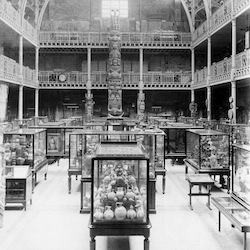 1998.267.264.1.1 View of the Pitt Rivers Museum after the arrival of the totem polesThe Museum displays archaeological and ethnographic objects from all parts of the world. It was founded in 1884 when Augustus Henry Lane Fox Pitt-Rivers, an influential figure in the development of archaeology and evolutionary anthropology, gave his collection to the University. The General's founding gift contained more than 20,000 objects but there are now over half a million. Many were donated by early anthropologists and explorers. The collection includes extensive photographic and sound archives which contain early records of great importance. The Museum continues to collect through donations, bequests, special purchases and through its staff and students, in the course of their fieldwork.
1998.267.264.1.1 View of the Pitt Rivers Museum after the arrival of the totem polesThe Museum displays archaeological and ethnographic objects from all parts of the world. It was founded in 1884 when Augustus Henry Lane Fox Pitt-Rivers, an influential figure in the development of archaeology and evolutionary anthropology, gave his collection to the University. The General's founding gift contained more than 20,000 objects but there are now over half a million. Many were donated by early anthropologists and explorers. The collection includes extensive photographic and sound archives which contain early records of great importance. The Museum continues to collect through donations, bequests, special purchases and through its staff and students, in the course of their fieldwork.
The museum also contains a large manuscript collection. Here is a full list of the relevant archival holdings at the Pitt Rivers Museum. Each list below is a link to a separate page about each collection
Follow this link to a full catalogue of all the manuscript collections at the PRM, from the PRM website. The links below are to collections of particular relevance to those interested in the development of museum anthropology at Oxford:
i. Pitt Rivers Museum papers in the manuscript collections at the PRM
ii. Oxford University Anthropological Society papers at the PRM
iii. Transcriptions of relevant correspondence relating to Pitt-Rivers' founding collection
iv. Transcriptions of all the Pitt Rivers Museum's Annual Reports 1888 to present
The following links lead to the descriptions of the manuscript collections held by the Pitt Rivers Museum for named individuals important to the development of museum anthropology at Oxford:
i. Henry Balfour's manuscript collections at the PRM
ii. Beatrice Blackwood manuscript collections at the PRM
iii. F.H.S. Knowles papers at the PRM
iv. Barbara Freire Marreco's papers at the PRM
v. R.R. Marett's papers at the PRM
vi. J.L. Myres' papers at the PRM
vii. T.K. Penniman manuscript collections at the PRM
viii. A.H.L.F. Pitt-Rivers' manuscript collections at the PRM
ix. Walter Baldwin Spencer's papers at the PRM: The most relevant of the letters in Spencer's correspondence to the development of museum anthropology are transcribed below:
Spencer papers Box 1: 1F (correspondence with Tylor)
Spencer Box 3: correspondence with Howard Goulty;
x. Arthur Thomson's papers at the PRM
xi. Edward Burnett Tylor's ms collection at the PRM: The most relevant of the letters in Tylor's correspondence to the development of museum anthropology are transcribed below. Note that you should follow this link to see all the papers in the Tylor manuscript collections at the PRM:
Tylor papers Box 11, Correspondents surnames beginning A-F: Aston & Chamberlain.
Tylor Box 11a, Correspondence from Boas (see below for correspondence from Fison).
Tylor Box 12, Correspondents surnames beginning G-K: Hale (for Howitt, see below).
Tylor Box 13, Correspondents surnames beginning L-R: Letter from Lane Fox dated 29 May 1879?; Andrew Lang correspondence; Leonard Arthur Lyall correspondence; G. Macmillan correspondence [re Spencer & Gillen Native Tribes]; E.H. Man correspondence; Miscellaneous including Max Müller and George Rolleston.
Tylor Box 13a: Correspondents surnames beginning S-Y and Miscellaneous: W.W. Skeat; Walter Baldwin Spencer
Bibliography of Tylor's publications prepared by Barbara Freire-Marreco in 1907
Correspondence from Tylor to WB Spencer, Spencer papers Box 1
Howitt and Fison:
Fison:
Tylor papers Box 11a: Fison Part 1 (letters 1 to 16); Fison Part 2 (Letters 17 to 30); Fison Part 3 (letters 31 to end);
Spencer papers Box 1: Fison to Spencer and Spencer to Fison letters 1893-1899; Fison to Spencer and Spencer to Fison letters 1900 on; undateable letters.
Howitt:
Tylor papers Box 12: Howitt Part 1; Howitt Part 2; Howitt Part 3
Spencer papers Box 1: Howitt
A paper about Fison and Howitt: Petch & Gibson, 2013 'The Ablest Australian Anthropologists': Two early anthropologists and Oxford' JASO, Online 5/1 (2013) pp. 60-85.
Global Fison & Howitt resources including those at PRM.
All transcriptions were completed by Alison Petch during the Scoping Museum Anthropology project 2012-2013.



